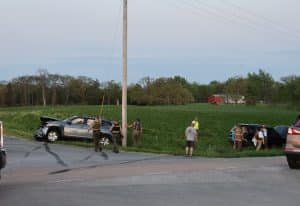ROE advocates for safer schools
Seeing the myriad of issues schoolchildren continue to face, Monroe-Randolph regional superintendent Kelton Davis is getting in on the ground floor to provide safer learning environments in the region.
The issue of school safety in the nation came into the forefront when a shooter killed 17 people at a Parkland, Fla. high school in February.
Davis showed the Republic-Times a photo of a child evacuating during the 2012 Sandy Hook Elementary School shooting in Connecticut, in which 26 people were killed, as an example of why he has turned his attention to this issue.
“The terror in this child’s face, who is about the same age as my daughter — this is why I’m passionate about this,” he explained. “I would never want to see a child with this look of terror.”
That said, Davis has designed a comprehensive model for school safety, delving into crisis training, facility preparedness and social-emotional health. The model serves as a way to pull organizations in the community together with schools to train and prepare for different crises.
“There’s a lot of people that need to come into play in terms of partners,” he said. “This is a vision. There’s a lot more work to be done.”
Under crisis training, Davis said K-12 training needs to include staff, community members and parents, and students. He added that training needs to focus on teaching people to adapt to their situation to choose the right course of action in that moment.
According to Davis, the 4E model under Tier One Tactical — Educate, Evade, Escape and Engage — teaches people how to do this. He is working with Tier One to get everyone involved in the training.
“It’s an options-based training, not simply lock the door and hide in a corner,” he said.
Davis indicated that current active shooter training does not get everyone engaged. In getting the parents involved, Davis said they can see what the schools are doing to protect their kids.
A March school safety communication and planning meeting gave momentum to the implementation of Davis’ model. During the meeting with local superintendents and law enforcement, Davis presented on communicating to parents when a crisis arises in a school.
“The biggest faux pas a school can make is not communicating (about a threat). Because the message is going to get out,” he said. “If you don’t own the message that is going out, the message will own you.”
He also talked about his vision for engaging students in 4E training. Meanwhile, Monroe and Randolph County sheriffs focused on responding to threats and active shooting events at schools during the meeting.
Prevention
Hardening of schools is one of the prevention measures Davis referred to when looking at school safety. This practice, Davis clarified, involves improving the security of schools with implementations such as single-point access and school resource officers.
“I would say for the most part our schools are close,” he said, mentioning that Valmeyer, Columbia and Waterloo schools have single-point access and other security features.
Davis said possible additions for these schools could include metal detectors or shatterproof glass, but added that no amount of hardening will prevent every active shooter situation.
“You can’t chain or lock exits. But that’s the only way you can harden a school to prevent people from coming,” he said.
The most effective form of prevention, Davis said, involves providing adequate mental health services for students. Davis said a lot of students face disciplinary actions for negative behaviors stemming from personal crises.
For instance, a student may get in trouble a lot for truancy but continues to miss school because of issues in the home.
Davis’ solution to the mental health issue is to work with state and federal representatives to remove barriers for schools to hire more professional counselors.
Current law prevents organizations such as Human Support Services from billing private insurance companies to provide counseling services at schools, Human Support Services Executive Director Anne King explained.
“I feel that (Davis’ plan) would be very beneficial and would allow us to have much more counseling support in all the schools without having to worry about where the dollars to support those clinicians will come from,” King said.
Davis recently conferred with King on his initiative and on what role HSS might play when it gets off the ground. Following the meeting, King said she is happy to support ROE efforts going forward.
Schools in Monroe and Randolph counties currently only have access to three social workers through HSS and Human Services Center.
“Our teachers cannot be expected to be mental health experts,” Davis lamented. “A mandated training will not adequately address mental health … This isn’t about blaming anyone. This is about getting help when the kid is available.”
Student leadership
Getting students involved in school safety also comes into play in Davis’ model. According to Davis, students can receive leadership training to help their peers with different challenges, such as dealing with a divorce or staying away from destructive decisions.
“They can point a student in the right direction. We’re not expecting mental health experts. And sometimes that student just needs someone to listen to them,” he said.
In April, Davis hosted an Operation Snowball workshop at the Sparta Shooting Complex through the Illinois Association for Behavioral Health. He said close to 40 students attended to learn how to recognize peers facing personal and mental health issues.
“I was extremely pleased,” he said of the event. “They were totally into it. During lunch, I was talking with kids and asking them about their backgrounds. And I got to know them and learn their struggles to see why they wanted to help other kids.”
One of the students who attended, Career Center of Southern Illinois student Trent Killy, said the program served as an eye-opener.
“I did think it had a lot of information about problems other kids have that you don’t think of at first,” he noted, referring to examples such as depression and drug use.
Killy also said he picked up techniques on how to get his peers to open up to him.
Davis is reaching out to local students to see if they will sign up for a leadership conference in July. The Illinois Association for Behavioral Health will host the Cebrin Goodman Teen Institute July 22-26 at Eastern Illinois University.
In total, Davis said his office can pay the registration fees for up to 21 students to attend.
“This is dealing with personal crisis and giving kids those leadership skills. Not that we are training them to be counselors because we are not,” he emphasized.
Davis presented his comprehensive model to the Illinois Association of Regional School Superintendents in Springfield this month. In doing so, Davis said he was offering the regional superintendents in attendance an opportunity to collaborate on applying the model to schools.
“Having spoken with several offices in the state of Illinois, they are looking forward to a defined model and working together on it,” he said.






